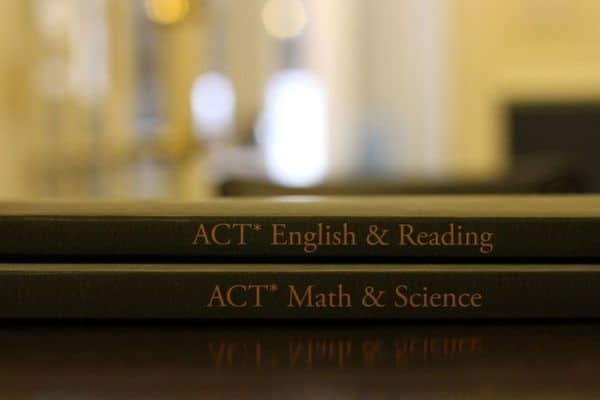After students and families anxiously log in to their ACT and College Board accounts on score release day, the first question many will ask is whether they should retest. Of course, there are always students who are exceedingly happy with their score, and they should celebrate by putting the ACT and SAT behind them. Others know nearly immediately that they’re unhappy with their scores and will certainly be retaking them. But what about those in the middle? How do you know if you should be happy with your score and not trying for more? To help inform your decision making, let’s explore several scenarios.
The student who “takes it cold”
A good number of students—in all likelihood a majority—will take an official ACT or SAT without any preparation. They may scroll through a website to learn the structure of the test or page through a guide one afternoon at a nearby bookstore. For these students, test day is an almost entirely novel experience. The timing of the test often proves more difficult in proctored conditions. Students typically experience fatigue and exhaustion especially on the Reading and Science sections at the end of the test. Sometimes too, students have adverse reactions to the pressure of test day and make silly mistakes—incomplete questions, mis-bubbling, and mental mistakes.
In most cases, these students should consider testing again. One or more of the aforementioned factors likely influenced them on test day, and consequently, the results may not reflect students’ full aptitude. Scores instead reflect the particular nuances on that particular test day in that particular testing environment—nuances that otherwise may not be accounted for. While some argue that this may be a more realistic snapshot of a student’s aptitude, the intricacies and content of the test prove otherwise. For example, grammar—a topic rarely covered in high school English—is covered extensively on both the ACT and SAT. Without at least some instruction, scores likely reflect a lack of content exposure rather than a lack of aptitude.
In order to gain the most from retesting after taking one cold, students should pursue a study plan to help them focus on areas of need and aim for optimal growth in areas of strength. Whether through self-study, a classroom setting, or one-on-one tutoring, students will produce scores that more accurately reflect their abilities after preparation. Without additional study, students may repeat their initial experience only subject to chance differences in the testing experience.
Join the A+ Newsletter!
We promise, no spam—just a monthly dose of educational insight, strategies, and exclusive tips straight to your inbox.
A prepared student’s first test
Before taking an official ACT or SAT, many students will spend weeks or months preparing. Through self-study, classroom instruction, or one-on-one tutoring, they learn the structure and content of the test. They master time management and find methods for approaching the various sections. The process ideally also involves a combination of homework and practice tests to keep students engaged with material and standardized testing leading up to test day.
Prepared students like these should expect scores that are consistent with their practice to this point—particularly their performance on any full-length practice tests they’ve taken. Hopefully, they find that their scores settle nicely between their best and worst homework results. And, assuming students have dedicated ample time and energy to the preparation process, they also should see significant growth from their initial diagnostic scores. In this way, students can reasonably hope for no major surprises when receiving their scores back.
That said, many students will continue to pursue preparation and look to an upcoming test date for a better score. While these students often see the most significant growth leading to their first official exam, many have potential for continued growth. At this point, students should pursue a more rigorous practice testing schedule to ensure they have full confidence and comfort with time management. They should consider the difficulties of the test they had recently taken and focus specifically on those sections. If possible, they should request the Test Information Release (TIR) for the ACT or the Question and Answer Service (QAS) for the SAT. Through these tools, students can gain a clearer understanding of the questions that gave them difficulty. With focused and continued work, prepared students should reasonably expect growth on their next official test.
A prepared student’s second (or more) test
After a second, third, or fourth test, the retaking question becomes more significant. Students thinking about retesting should consider their entire practice and official test history. Sometimes, students will find that they have well out-performed any of their work to this point: achieving two points or higher than their highest score to date. In these cases, students should consider their testing finished. Repeat testing can result in score plateaus or even score drops.
Other times, students find their score to fit right within their growth. In this case, they’re walking away with an expected score and should strongly consider leaving well enough alone. In some circumstances, however, an added point could make a huge difference—it could impact a student’s superscore or scholarship opportunities. Such students can certainly consider testing again but only if they feel motivated and prepared to focus for an additional six to eight weeks. Generally speaking, students will usually have reached a score representative of their aptitude after multiple tests.
In unique circumstances, some students will dramatically underperform on a second or third test day—leaving them with a disappointing score at least two points below where they had been scoring on practice exams. Depending on the impact of the score, along with student morale, a retest can be seriously considered at this point. Students should reflect on their test date and provide as much detail as possible in describing the discrepancy in scores. Typically, students can recall a particularly difficult passage, an unexpected mismanagement of timing on a certain section, or a distraction in the testing environment. Hopefully, these students would not face such idiosyncrasies on future test dates.
The bottom line
Most importantly, students and families need to keep standardized testing within its context. As we often explain to families, the ACT and SAT are both tools of the college application process. Within them, we can find incredibly important skills that students should strive to master to the best of their ability. The score itself, however, will not travel beyond the college admissions committee.
In this sense, retesting is essentially a question of goals. What schools are at the top of your list? What score range will make you competitive for those schools? If your ACT or SAT score puts you in the competitive range for a certain school, you should seriously consider not continuing. While higher is always better, junior and senior year bring plenty of other commitments that need to be taken seriously. With testing out of the way, students can focus on maintaining strong grades in academically rigorous courses along with any extracurriculars in which they are involved. They can even find some free time to enjoy being a kid!



